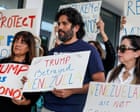
In recent days, a series of influential events have unfolded, offering glimpses into pressing issues concerning immigration, public demonstration, and inclusivity within religious traditions. These events, while diverse in their nature and locale, reflect ongoing conversations and shifts within society that invite us to consider the evolving landscapes of community, justice, and acceptance.
In a significant judicial turn in the United States, a federal ruling has safeguarded the livelihoods of over a million Venezuelan and Haitian nationals residing in the country. The decision rendered by US District Judge Edward Chen serves as a pivotal block against efforts to terminate Temporary Protected Status (TPS) for these communities. Initiated under the Biden administration, TPS permits individuals from designated countries experiencing dire conditions—such as armed conflict or environmental disasters—to live and work legally in the US. This ruling extends hope to nearly 600,000 Venezuelans whose protections had recently lapsed or were imminently expiring, enabling them continuity of life and employment in the US. This legal reaffirmation delineates the enduring responsibility towards humanitarian principles amid shifts in policy intentions.
Simultaneously, across the Atlantic, public activism echoes in the streets of London, where demonstrators have once again raised their voices in opposition to the proscription of Palestine Action. This organization, known for its advocacy against arms trade practices related to conflict zones, encountered increased support as recent protests drew over a thousand participants, voicing dissent against governmental restrictions. These gatherings are marked by a commitment to civil disobedience, with many pledging to face arrest in light of their cause, underscoring a resilient and widespread determination to challenge legal boundaries deemed misaligned with ethical activism.
Meanwhile, nestled within the historic and spiritual heart of the Vatican, a groundbreaking moment unfolds as LGBTQ+ Catholics participate in the Jubilee ceremonies by entering through the Holy Door. This public inclusion highlights the gradual shift within the Catholic Church towards embracing diversity and promoting acceptance. The presence of approximately one thousand members from the LGBTQ+ community in this ancient ritual signifies a gentle, yet firm step towards reconciling faith and identity, reflecting broader aspirations for harmony within religious narratives.
These stories, while distinct, speak to the profound role of laws and beliefs in shaping communal landscapes. They invite us to pause and reflect on our interconnectedness, the roles we play in nurturing community, and the dialogues essential for fostering inclusivity and compassion in diverse societies. Whether it be through legal rulings, public protests, or spiritual ceremonies, the movement towards equitable and inclusive practices continues steadily, fostering hope for harmonious cohabitation and mutual respect.
Source: {link}
